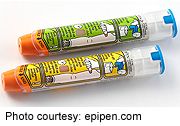Epinephrine should be used as first-line therapy for anaphylaxis and those at risk for anaphylaxis
MONDAY, Aug. 10, 2015 (HealthDay News) — Allergists and emergency medicine physicians should continue to work together to improve anaphylaxis care, according to a review published online Aug. 6 in the Annals of Allergy, Asthma & Immunology.
Stanley M. Fineman, M.D., from the Emory University School of Medicine in Atlanta, and colleagues reviewed recent scientific literature relating to anaphylaxis, barriers to care, and improvement in emergency anaphylaxis care. An expert panel of allergists and emergency physicians was convened to discuss medical management of anaphylaxis across the continuum of care: from the emergency department through long-term care.
Difficulties in making an accurate diagnosis, low rates of epinephrine administration during acute management, and inadequate follow-up were identified by the panel as key barriers to anaphylaxis care. They emphasized that epinephrine should be used as the first-line therapy for those with anaphylaxis or at risk for anaphylaxis and for those with severe allergic reactions; when in doubt, epinephrine should be administered. The panel discussed strategies to overcome the barriers identified and made recommendations for future allergist/emergency physician collaboration. They also proposed key messages to be communicated to emergency practitioners.
“The panel recommended that allergists and emergency physicians continue to work in partnership, that allergists be proactive in outreach to emergency care practitioners, and that easy-to-access educational programs and materials be developed for use by emergency medical systems and emergency department practitioners in the training environment and in practice,” the authors write.
The study was funded by an educational grant from Mylan Specialty.
Copyright © 2015 HealthDay. All rights reserved.








